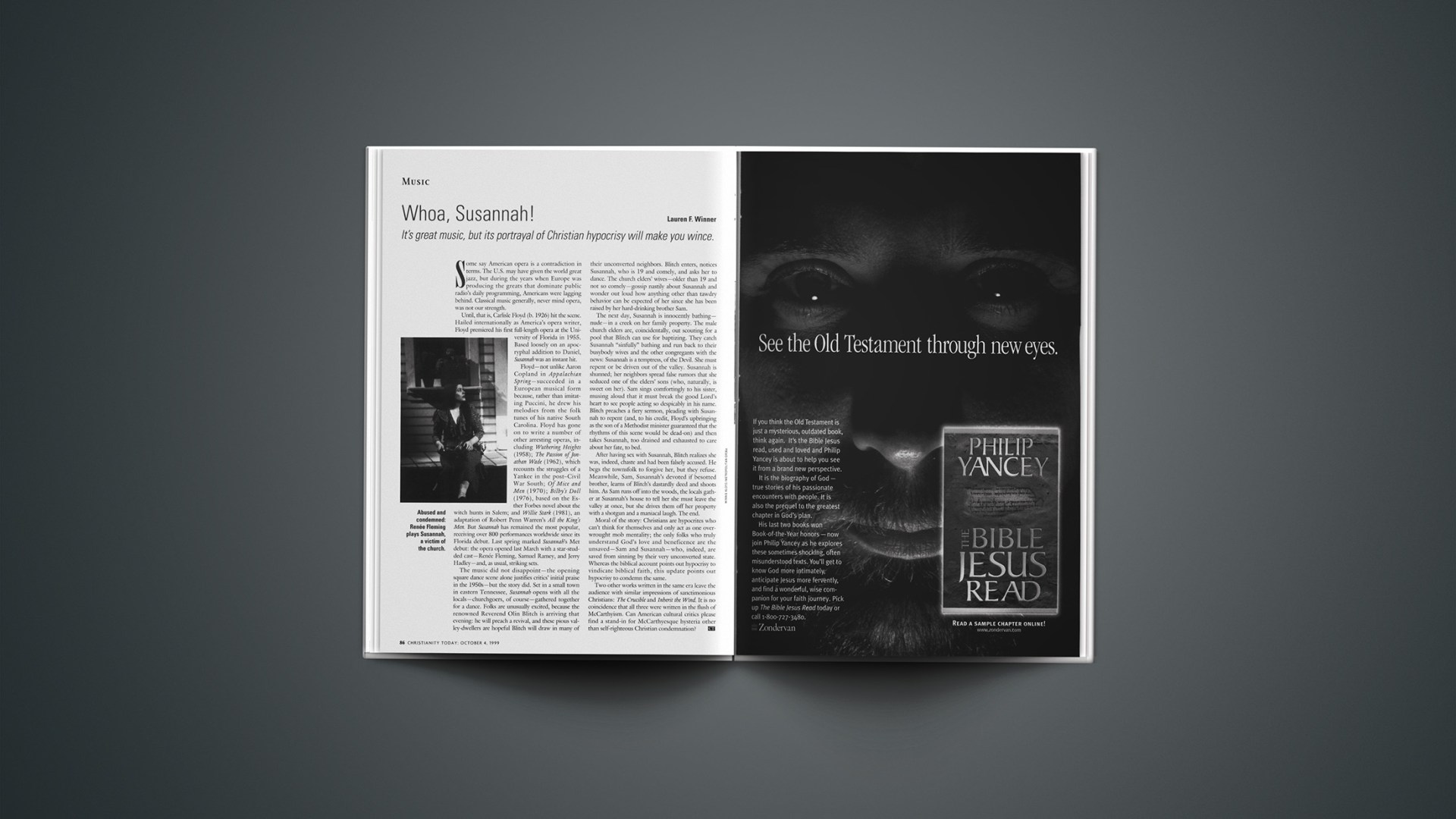Some say American opera is a contradiction in terms. The U.S. may have given the world great jazz, but during the years when Europe was producing the greats that dominate public radio’s daily programming, Americans were lagging behind. Classical music generally, never mind opera, was not our strength.
Until, that is, Carlisle Floyd (b. 1926) hit the scene. Hailed internationally as America’s opera writer, Floyd premiered his first full-length opera at the University of Florida in 1955. Based loosely on an apocryphal addition to Daniel, Susannah was an instant hit.
Floyd—not unlike Aaron Copland in Appalachian Spring—succeeded in a European musical form because, rather than imitating Puccini, he drew his melodies from the folk tunes of his native South Carolina. Floyd has gone on to write a number of other arresting operas, including Wuthering Heights (1958); The Passion of Jonathan Wade (1962), which recounts the struggles of a Yankee in the post Civil War South; Of Mice and Men (1970); Bilby’s Doll (1976), based on the Esther Forbes novel about the witch hunts in Salem; and Willie Stark (1981), an adaptation of Robert Penn Warren’s All the King’s Men. But Susannah has remained the most popular, receiving over 800 performances worldwide since its Florida debut. Last spring marked Susannah‘s Met debut: the opera opened last March with a star-studded cast—Renee Fleming, Samuel Ramey, and Jerry Hadley—and, as usual, striking sets.
The music did not disappoint—the opening square dance scene alone justifies critics’ initial praise in the 1950s—but the story did. Set in a small town in eastern Tennessee, Susannah opens with all the locals—churchgoers, of course—gathered together for a dance. Folks are unusually excited, because the renowned Reverend Olin Blitch is arriving that evening: he will preach a revival, and these pious valley-dwellers are hopeful Blitch will draw in many of their unconverted neighbors. Blitch enters, notices Susannah, who is 19 and comely, and asks her to dance. The church elders’ wives—older than 19 and not so comely—gossip nastily about Susannah and wonder out loud how anything other than tawdry behavior can be expected of her since she has been raised by her hard-drinking brother Sam.
The next day, Susannah is innocently bathing—nude—in a creek on her family property. The male church elders are, coincidentally, out scouting for a pool that Blitch can use for baptizing. They catch Susannah “sinfully” bathing and run back to their busybody wives and the other congregants with the news: Susannah is a temptress, of the Devil. She must repent or be driven out of the valley. Susannah is shunned; her neighbors spread false rumors that she seduced one of the elders’ sons (who, naturally, is sweet on her). Sam sings comfortingly to his sister, musing aloud that it must break the good Lord’s heart to see people acting so despicably in his name. Blitch preaches a fiery sermon, pleading with Susannah to repent (and, to his credit, Floyd’s upbringing as the son of a Methodist minister guaranteed that the rhythms of this scene would be dead-on) and then takes Susannah, too drained and exhausted to care about her fate, to bed.
After having sex with Susannah, Blitch realizes she was, indeed, chaste and had been falsely accused. He begs the townsfolk to forgive her, but they refuse. Meanwhile, Sam, Susannah’s devoted if besotted brother, learns of Blitch’s dastardly deed and shoots him. As Sam runs off into the woods, the locals gather at Susannah’s house to tell her she must leave the valley at once, but she drives them off her property with a shotgun and a maniacal laugh. The end.
Moral of the story: Christians are hypocrites who can’t think for themselves and only act as one overwrought mob mentality; the only folks who truly understand God’s love and beneficence are the unsaved—Sam and Susannah—who, indeed, are saved from sinning by their very unconverted state. Whereas the biblical account points out hypocrisy to vindicate biblical faith, this update points out hypocrisy to condemn the same.
Two other works written in the same era leave the audience with similar impressions of sanctimonious Christians: The Crucible and Inherit the Wind. It is no coincidence that all three were written in the flush of McCarthyism. Can American cultural critics please find a stand-in for McCarthyesque hysteria other than self-righteous Christian condemnation?
Copyright © 1999 Christianity Today. Click for reprint information.










